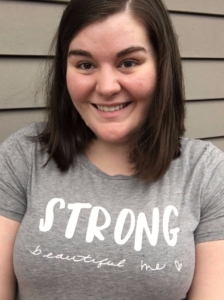It’s Complicated: My Struggle with Emotional Eating
The use of food for emotional comfort is often normalized in our culture. It’s very common to see TV shows or movies portraying actresses drowning their sorrows after a breakup by eating a tub of ice cream or an entire box of chocolates. That tells us that it’s acceptable to use food to cope with difficult emotions. For some people, that may be effective and not seem problematic, but it’s far more complicated for someone with an eating disorder.
Food has been a source of comfort for as long as I can remember. As a kid, food was something that I could count on to make me feel better. When my ballet teachers criticized my size, one of the first things I did after class was ask my mom if we could stop for a milkshake. I knew eating that would only make my ballet teachers pick on me more, but I also knew that for a little while it would bring me comfort and distract me from the sadness I was feeling.
Several years later, my eating disorder began with restrictive tendencies. It became a way for me to control my body and my relationship with food. It was almost like a coping skill for all of the anxiety centered on food and body image struggles. When my eating disorder transitioned into BED, I felt as though my relationship with food had returned to emotional comfort.
When I was more actively engaging in my eating disorder, I knew that bingeing wouldn’t solve any of my problems. I knew that after a binged I would feel guilty and ashamed, and it would only make me spiral further into my eating disorder. However, I also knew that I would feel comfort for a short amount of time, and that almost always convinced me that it was worth it.
All of this honestly makes me wonder, will I ever be able to think of food as just something that tastes good and fuels my body, or will there always be times when I think of using it for emotional comfort? When something has been a coping skill for as long as I can remember, it feels nearly impossible to find something that could replace it entirely.
Over the years, therapists have tried to help me find something else that could fill that emotional desire, but nothing has worked as well as food. I have experimented with alternatives such as photography, journaling, watching a favorite movie, etc., but they have never brought the same comfort and security that food does, nor have they felt as though they were consistently as available as food has been.
Even though I have been in treatment for my eating disorder several times over the past five and a half years, I still really struggle with this aspect of my recovery. I feel stronger and more stable than I ever have, yet food still has this power over me. I try to make a consistent effort every single day and the truth is, it’s exhausting. Healing the various relationships with yourself is one of the most difficult parts of eating disorder recovery, but I will continue to pursue healing, one baby step at a time.
Emily Locke is a college student, writer, and dancer. She is from Portland, OR but recently began studying as a sophomore at North Carolina State University, and plans to major in English with a creative writing concentration and minor in Psychology. She has battled mental illnesses from a young age, and as a result is very passionate about raising awareness for eating disorders, anxiety, and depressive disorders, and promoting a positive body image. She hopes to someday be a published author and eating disorder activist. To read more of her writing and follow her journey, check out her blog.





